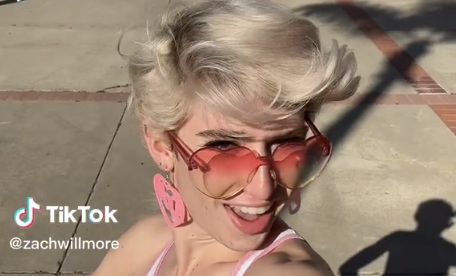Zach Willmore is an LGBT TikTok influencer whose bright and bubbly style draws a sharp contrast with other creators on the platform. Often appearing with a cheerleader’s somersault and a blinding smile, he is a departure from the dark and dour late-millennial hopelessness and victimhood found elsewhere on the internet.
Willmore is not alone in this approach. In this relentlessly upbeat (or grating, depending on the viewer) genre, he’s joined by creators like Dylan Mulvaney, who quickly found fame and funding from their “girlhood” diary, and Chrissy Chlapecka, whose content marries misandrist provocations with a drag queen performance style. But there’s something curious about Willmore’s content. He doesn’t just represent the gay theatre kid archetype — he’s also, with his trademark ebullience, documenting his journey with HIV.
On the one hand, there’s something admirable about Willmore’s effort to educate his audience about HIV, which today is thankfully no longer the death sentence it was in the 1980s and ‘90s. But on the other, there’s something morbid about the spectacle of making videos of his “journey” less than two weeks into an HIV diagnosis. All of this is interspersed with his lighthearted romps through his college campus, to frat parties, to somersaulting into the frame encouraging his “besties” to get tested. Even if HIV is manageable, it’s not a condition that lends itself easily to an upbeat, highly aestheticised video diary. HIV is still considered deeply traumatic: even a negative test result is given to patients delicately.
If Willmore isn’t alone in campy TikToks, he’s also not alone in making smiley TikToks about deeply personal and distressing medical conditions. Scroll the app long enough and you’ll see other HIV+ creators; parents with kids on life support or who have other severe illnesses (like the #FrostArmy, two children suffering from INAD); and young women recovering from eating disorders through the lens of “what I eat in a day” videos. That’s not to mention hospice patients, some in the final days of Voluntary Stopping Eating and Drinking (VSED), a process in which a mentally capable person with a terminal illness makes the conscious decision to end their life.
An obvious and uncharitable reading of these creators would be that they’re trying to profit off of their (or their children’s) health conditions. Internet gossip sites like KiwiFarms and lolcow.farm document the worst among them, sussing out where the oversharing stops and the grift angle begins. Are these people faking their illnesses, as Hope Otto — who allegedly feigned a hospice stay and ostensibly faked her own death on TikTok — was accused of doing? Or are they just exploiting a real tragedy, like the parents of the “Hartley Hooligans,” two young children with severe microcephaly, were said to have done?
In the eyes of the cynics, HIV, like VSED and microcephaly, like Mulvaney’s transition into “girlhood”, is another differentiator in a sea of wannabe internet celebrities searching for corporate sponsorship. And certainly, for some of these creators, that might be the case.
But there’s another perspective from which we can understand this sea of TikTok morbidity. Perhaps the only way these people know how to process their emotions is by sharing them online — a way of validating that they are real. Inured to the format, with more hours banked scrolling than talking to a community face-to-face, it is possible that they can only understand their own lives through the lens of TikTok.
Commercialising that pain needn’t be a purely selfish act. Rather, it is just a very modern method for processing grief. Like writing poetry or drinking to excess in an earlier era, today’s generation sees the video diary format as a viable expression of catharsis.











Join the discussion
Join like minded readers that support our journalism by becoming a paid subscriber
To join the discussion in the comments, become a paid subscriber.
Join like minded readers that support our journalism, read unlimited articles and enjoy other subscriber-only benefits.
Subscribe